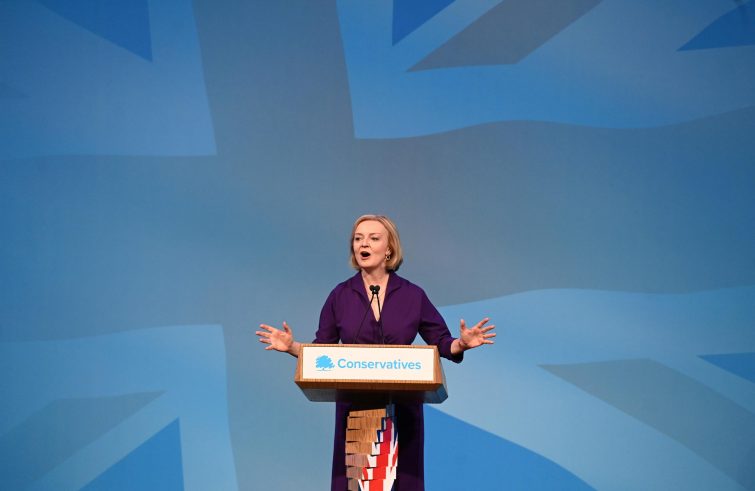
Foreign Secretary Liz Truss, born in 1975, newly-elected leader of the Conservative Party, replaces Boris Johnson as Prime Minister of the United Kingdom. She was chosen by the Conservative Party members (172,000 cast their vote; her opponent was Rishi Sunak, former Chancellor of the Exchequer). She arrives at number 10, Downing Street at a time when her country is reeling from a crisis in the economy and the consequences of Brexit, against the backdrop of the war in Ukraine, which presages times of uncertainty… Johnson is leaving behind a discredited politics and a discredited Party in the eyes of most: Truss will have to struggle to regain popularity, crushed by the personality of Margaret Thatcher, whom she is evidently trying to imitate.
![]() We discussed the subject with Joelle Grogan, Senior Researcher (Research Fellow) at UK in a Changing Europe and lecturer at London’s King’s College. “In my view, the new prime minister has the most challenging mandate of any post-war prime minister before her, and one of the thorniest in British history. She faces a divided party, a divided country, a divided world. It will be no easy task for the new leader to navigate the troubled economic situation at home and at the international political level, not least because of her lack of charm and her limited communication skills as compared to her predecessor.”
We discussed the subject with Joelle Grogan, Senior Researcher (Research Fellow) at UK in a Changing Europe and lecturer at London’s King’s College. “In my view, the new prime minister has the most challenging mandate of any post-war prime minister before her, and one of the thorniest in British history. She faces a divided party, a divided country, a divided world. It will be no easy task for the new leader to navigate the troubled economic situation at home and at the international political level, not least because of her lack of charm and her limited communication skills as compared to her predecessor.”
How serious is the economic situation facing Liz Truss?
The situation is extremely difficult. The government can no longer blame the crisis on the pandemic, nor on Brexit, and the negative consequences of Britain’s exit from the EU are becoming apparent, exacerbated by the Covid pandemic and the war in Ukraine. Inflation could hit 15% this winter and the cost of living will worsen further. The daily life of ordinary people is about to become much harder.
Is former PM Boris Johnson, who chose to stay in parliament and intends to come back as leader of the country, an obstacle for Liz Truss?
Without a doubt. I expect that, in a year or two, the newly elected leader will either face either a further challenge within her party, or a general election, prompted by Labour opposition leader Keir Starmer, who is currently ahead of Tories in the polls.
Both scenarios could see the Tories decide to bring back Boris Johnson as their leader, in the belief that he would guide them to victory.
Nevertheless, the outcome of the vote is likely to be very different from the 2019 election, when Johnson won a huge majority. The economic crisis and inner-UK tensions resulting from Scotland’s and Northern Ireland’s desire for independence are bound to emerge. I would be surprised if the Conservative Party were to win.
Will Truss’ appointment have an impact on the UK’s relations with the European Union?
Although the newly appointed PM voted for Britain to remain a member of the European Union in the referendum of June 23, 2016, she is now very critical of Europe. While it may be possible that her stance will be softened by the fact that she will no longer have to convince the Tories, the Brexit hardliners, it seems very unlikely. Likewise with regard to Northern Ireland, Liz Truss already said that she plans to pursue the policy of her predecessor Boris Johnson and suspend parts of the Northern Ireland Protocol, signed by the UK and the EU, whereby Northern Ireland remains in the EU single market for goods with a customs border in the Irish Sea.
Liz Truss portrayed herself as the political heir to Margaret Thatcher, whom she impersonated in a school play when she was a child, and whose attire she emulates. Do the two premiers resemble each other?
I would certainly argue that they don’t. The Iron Lady remained true to her principles, whereas Truss changed her stance several times. Moreover, Mrs Thatcher raised taxes during the period of inflation, in an attempt to slow down the economy, while Truss wants to lower them, but it’s not clear where she will find the money to finance the NHS.
One thing the two women have in common is their dislike of trade unions.
The new PM might decide to walk away from the European Convention on Human Rights that guarantees UK workers the right to strike, which they don’t have here, or she may try to pass a law denying workers the right to take to the streets.









